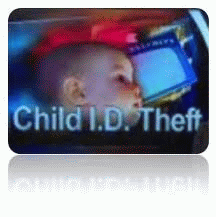Child Identity Theft:
Is my Child’s Identity at Risk?

In 2011 a Child Identity Theft study was released by Richard Power a Distinguished Fellow from Carnige Mellon CyLab and there is new evidence that indicates that thieves are targeting children for unused social security numbers. That should be “chilling” news to any parent who has applied for a social security card for their child.
Key Findings from this study include:
1. 10% of the children in the report have someone else using their social security number – 51 times higher than the rate for adults in the same population.
2. Child ID’s were used to purchase homes and automobiles, open credit card accounts, secure employment and obtain drivers licenses.
3. The largest fraud ($725,000) was committed against a 16 year old girl.
4. The youngest victim was five months old; 303 victims were under the age of five.
FTC finds child identity theft a growing problem
In addition to the Mellong study on child identity theft a recent study completed by risk Management Company IDAnalytics who released the results during a recent Federal Trade Commission forum more than 140,000 children are victims of identity fraud annually.
Child identity theft risk appears to come from fraudulent use of cell phones. The research was based on a review of 172,000 children’s cell phone accounts that were protected by Consumer Notification Service. Children are 51 times more likely to be targeted than adults according to Identity Protection Service Company Debix.
What puts children at risk is there Social Security number. Their number is virtually unused so its easy for a criminal to use the number to associate with a different name and birth date.There is not an easy way to detect the theft of a child’s identity. According to the Identity Theft Resource center, “credit monitoring services are a good tool for parents, but not for kids”. The other reason this is an issue is that checking credit reports catches identity theft about one percent of the time.
Parents can be take action buy becoming aware and protecting their kid’s privacy online. Parents need to become educated on how online works. When someone asks for your child’s social security ask questions before providing the number. Ask questions on who will have access to it and is it necessary. What kind of security will be in effect to maintain security and privacy? Be careful what you share and monitor all information. You can’t be too cautious today.
What should I do if I suspect my child may be a victim child identity theft?
Parents do not need to become paranoid; they just need to become aware and vigilant. If you believe that your child is a victim – here are some of the steps to take.
1. Check the credit bureau’s to see if your child has a credit report. The three main credit bureaus are:
a. Equifax, toll-free telephone number (800) 525-6285;
b. Experian, (888) 397-3742; and
c. Trans Union, (800) 680-7289.
2. Your child should not have a credit report, if the credit bureau says they would be happy to send you a report, you probably have a problem.
3. If child identity theft has occurred, parents need to file a report with the local police and keep a copy of the report in case it's needed later.
4. If your child’s Social Security number is or has been used fraudulently contact the Social Security Administration at (800) 269-0271 or oig.hotline@ssa.gov.
5. Parents can also file a complaint with the Federal Trade Commission Identity Theft Clearinghouse at 877-ID-THEFT (438-4338).

Return to the top - Child Identity Theft
Back to Types of Identity Theft
Back to the Home Page








